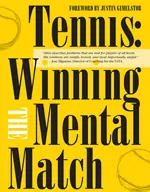Your game tends to follow your emotions, positive ones producing good play, and negative ones bad play. So you need to control them rather than having them control you.
The starting point for this is the following: When a point ends, have no feeling or emotional reactions at all. It means that whether you have made the most egregious error or hit the most outlandish winner, it's generally best to have no emotional reaction whatsoever.
More: 3 Ways to Reverse Your Opponent's Momentum
No matter how important the point, when it's over, regardless of outcome, you simply turn around and start walking back into position having had no emotional reaction.
As an example, watch Roger Federer's face at the end of a point. You will not usually be able to tell if he has just hit a winner or missed a sitter. Most of the time, he doesn't react. You see the outer lack of reaction, but, equally importantly, he doesn't usually react internally either.
More: 3 Ways to Mentally Dominate Your Opponent
What about reacting positively after winning a point? Okay, let's start with the obvious counter arguments. You may say, "What if I hit a good shot? Shouldn't I celebrate or pump myself up with a raised fist or something? Doesn't this fit better with your theory of having good emotions so your game will follow them and get better?"
My answer is that most highly ranked professional players do not do this. Notice I say most and not all. Of course some players, like Lleyton Hewitt, Jimmy Connors, Rafael Nadal, John McEnroe, and Maria Sharapova do (or did) play better by pumping themselves up after winning points. But even they didn't do it after every point they won -– often, yes, but only after some points.
More: How to Overcome the Hit-and-Hope Mentality
These few players performed well on adrenaline and seemed, somehow, to be able to emote again and again without getting emotionally exhausted. But keep in mind that these people are champions with far more emotional resiliency, self-control, and confidence than you or I have. (If you win a couple of Wimbledons you might also be able to get away with it, but until then, I advise against it.)




